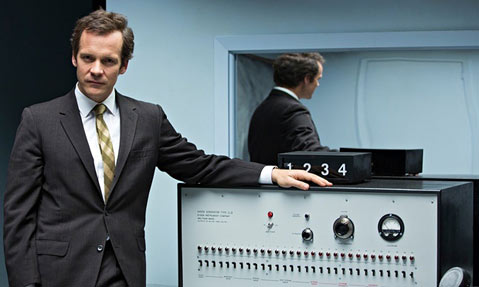‘The Experimenter’ Show Mindless Obedience is Still with Us
Peter Sarsgaard Stars as Psychologist Stanley Milgram

By the end of this movie, you may not know who is being described by the title — Stanley Milgram, the topic of this offbeat biopic, or Michael Amareyda, the often offbeat director who gave us art house vampire Nadja, Ethan Hawke as Hamlet, and now this movie that owes equal debts to educational documentaries and the underrated guys who created the blue screen effects of Sky Captain and the World of Tomorrow.
You may remember Milgram, played with a studious intensity by the always rumpled Peter Sarsgaard, from psychology and sociology textbooks for his the dismayingly revealing Yale experiments in 1961 in which volunteers were mildly coerced into administering steeply increasing electric shocks to other volunteers. (The shocks were faked.) Inspired by the Nazi camps, what Hanna Arendt called “the banality of evil,” Milgam’s experiment furnished damning proof that everyday people were capable of cruelty. The story is made more compelling because Milgram, who created at least two other famous sociology experiments, was accused of every kind of evil by colleagues and the press until suddenly most people had to admit he was right.
But the method of presentation is what’s unusual here. Made with few stars — Sarsgaard, Winona Ryder, and Santa Barbara’s own Anthony Edwards — the film feels more like a play than a Hollywood extravaganza. The scenes are intimately staged, especially during the experiment itself. But when the movie “opens up,” the characters often break the fourth wall and talk directly to us. At the same time, the backdrops feel artificial, too. Clearly filmed against a blue screen, the city streets, campus facades, and ding rooms look fake. What this does is to underscore the use of fakery to reach an unpleasant truth about human nature. Don’t go to this movie expecting complete objectivity — the filmmakers believe Milgram was a hero and nearly a martyr to the cause of countering illusions. The Experimenter’s elucidation of fake and real shouts pretty loud that mindless obedience is common enough to be frightening, and still with us.



